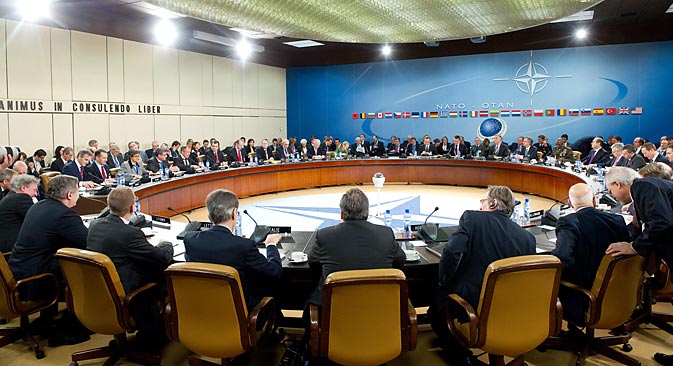
The agenda of a series of meetings of foreign ministers will include the situation in Afghanistan, developing relations of NATO with Russia and Georgia and the upcoming NATO summit. Source: Press Photo
Russian Foreign Minister Sergei Lavrov and his counterparts from the NATO member states are expected to exchange opinions on issues concerning Euro-Atlantic security, namely the situation in and around Syria, the Middle East and Afghanistan, at the Russia-NATO Council session scheduled to begin on Dec.3.
Additionally, an important component of the meeting will be a discussion of prospects for cooperation on Afghanistan in the light of the upcoming withdrawal of the ISAF mission in 2014. Particular attention will be paid to the need to ensure an international legal basis for NATO's proposed presence in Afghanistan.
Lavrov will arrive in Brussels on late on Dec. 2 for the session.
“Given NATO's decision to wind up international military presence in Afghanistan in 2014, it is planned to discuss the situation in that country,” a source at the Russian Foreign Ministry has told RBTH.
“We believe that these actions should be counterbalanced by efforts to improve the combat readiness of the Afghan armed forces so that they are capable of controlling security in their country, and combating extremist groups and drug crime."
The council will discuss the implementation of agreements reached at the Russia-NATO Council summit in Lisbon in November 2010 regarding the formation of a common space of peace, security and stability in the Euro-Atlantic region.
Russia intends to stress the need to take practical steps towards reaching that goal. In particular, it is planned to sum up the work of the Russia-NATO Council in 2013 and to discuss priorities for further cooperation and then, depending on the outcomes of the discussion, to adopt the Russia-NATO Council program of work for 2014. The sides will also discuss preparations for an ammunition disposal project with the use of advanced environmentally clean technologies.
Agenda of NATO meetings in Brussels includes Afghanistan, relations with Russia, Georgia
Lavrov says West needs to do their ‘homework' on Syria
U.S. cancels plans to buy Russian helicopters for Afghanistan
Cooperation between Russia and NATO has obvious successes in the following areas: the fight against terrorism and piracy, natural and manmade disaster response, and Afghanistan.
Yet there are still tensions between Russia and NATO on fundamental issues. Russia is still hoping to receive, as part of the missile defense dialogue, written guarantees that that the European missile defense system being created by NATO is intended for countering limited missile challenges outside Europe, rather than targeted against Russian strategic nuclear forces.
For instance, a powerful radar station that NATO proposes to set up in Turkey and will largely overlap with an already existing radar station in the South Caucasus, and will be able to cover most of Russian territory.
However, it is unlikely NATO will meet Russia's demand of written guarantees that the European ABM system will not target it’s own defense systems.
"Firstly, should we start negotiations on an agreement with all its legal parameters, can you imagine how long it will take?” said Thrasyvoulos Stamatopoulos, NATO’s assistant secretary general for political affairs and security policy.
“Russia has already been provided with the relevant political guarantees. Secondly, we have urged Russia to study the physical parameters of the European missile defense system, which show that the system we are creating does not pose a threat to Russian nuclear deterrent forces. Thirdly, we have invited our Russian partners to work on specific aspects of the European missile defense system, which would make it possible to strengthen trust and transparency. I would like to stress that Russia is the only NATO partner to have received such an invitation."
At the council meeting, Lavrov may hold bilateral meetings with NATO Secretary-General Anders Fogh Rasmussen and, possibly, with his U.S. counterpart John Kerry.
All rights reserved by Rossiyskaya Gazeta.
Subscribe
to our newsletter!
Get the week's best stories straight to your inbox